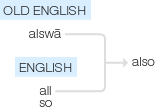Also
Old English alswā ‘quite so, in that manner, similarly’ (see all, so1).
wiktionary
From Middle English also, alswo, alswa (also als(e), as, whence English as), from Old English ealswā, eallswā(“completely so, additionally, just as, just so, even as, even so, as, as if, so, so as, likewise, also; likewise, in just the same way”), equivalent to all + so. Cognate with Scots alsa, alswa(“also, even so, in the same way, as, as well”), Saterland Frisian also(“accordingly, therefore, thus”), West Frisian alsa(“so, just so, even so, thus”), Old Saxon alsō(“similarly, as if, just as, when”), Dutch alzo(“so, thus”), German also(“so, thus”), Danish altså(“so”), Norwegian Bokmål altså(“so, therefore, accordingly, thus”), Norwegian Nynorsk altso(“so, accordingly, therefore, thus”), Swedish alltså(“so, therefore, accordingly, thus, then”). See all, so, as.
etymonline
also (adv., conj.)
Old English eallswa "just as, even as, as if, so as, likewise," contraction of eal swa, from all "altogether" + so. Originally an emphatic form of so. The sense of "wholly so" weakened to "in addition to, in the same way," replacing eke. Used in Old English to introduce a sequel to a preceding statement, "and so, then, therefore." Used from c. 1200 in connecting sentences, "in addition, moreover." The compound has parallel forms in German also, Dutch alzoo. English as is a shortened form of it.
Early ME has the phrase as well as the compound. The reduced forms alse, als, as gradually become established in certain constructions, the fuller also in others .... The clear distinction between also and as is not attained until the 15th century. [Middle English Compendium, University of Michigan]
